Australia will keep screwing up the religion question in its 2026 Census
The question about religion is poorly worded and undercounts non-religious people. The Bureau of Statistics won't fix it.
This newsletter is free, but it’s only able to sustain itself due to the support I receive from a small percentage of regular readers. Would you please consider becoming one of those supporters? You can use the button below to subscribe to Substack or use my usual Patreon page!
Australia’s Bureau of Statistics conducts its census every five years, and it’s a valuable tool to understand the shifting religious demographics in the country. Unfortunately, because of the way the religion question is worded, the results will once again severely undercount the percentage of non-religious people.
Just as background, the percentage of Australians with no religious affiliation has jumped from 22.2% in 2011, to 30.1% in 2016, to an astonishing 38.9% in 2021, marking a rapid shift away from organized religion.
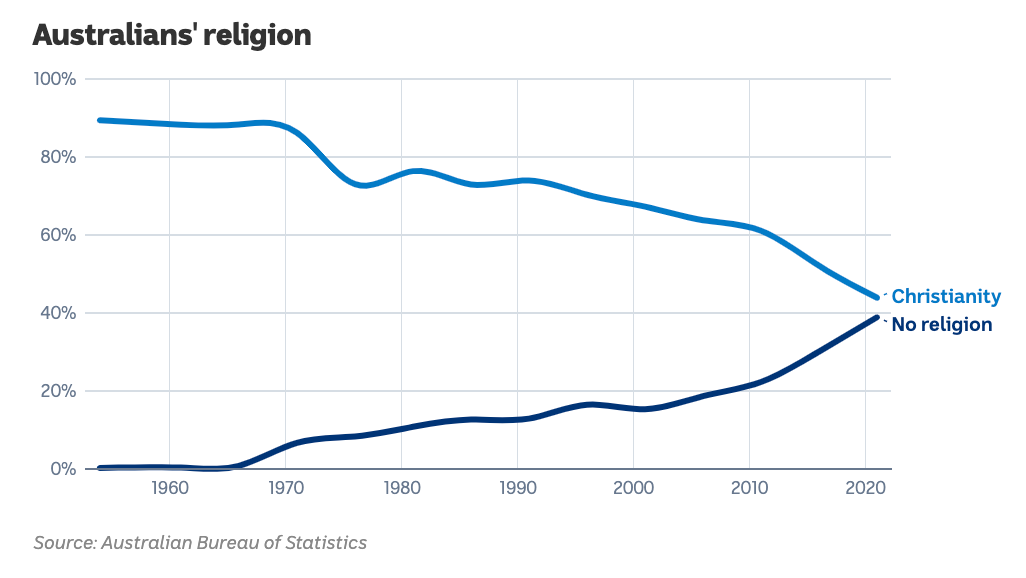
While Christianity was still the most popular religion in Australia in 2021, that year marked the first time the majority of Australians said they were not Christian. There was even reason to believe that, by 2026, non-religious people could outnumber Christians given that 46% of Millennial Australians had no religion, compared to 30% of Baby Boomers.
But all of that really depends on how the religion question is worded… and that question has been the subject of all kinds of controversies over the years.
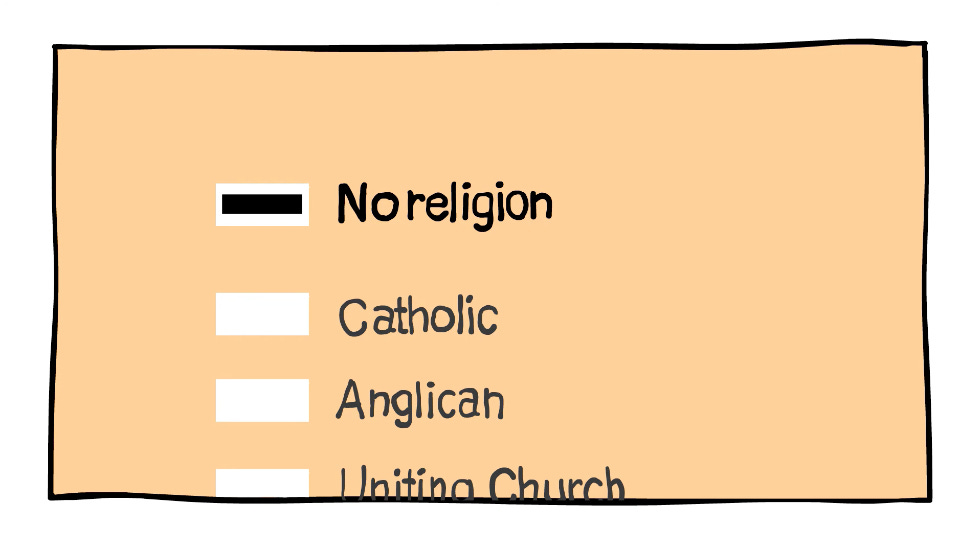
Here’s how the question looked in 2011:
You can see that “No religion” was placed in No Mans Land, at the bottom of a long list of options… including Other! It was so confusing! How many people saw the first options on the list and just filled in the bubble for whatever religion they were raised in regardless of what they actually believed? It was a horrible way to get accurate information.
In 2016, the question got a little better. “No religion” was placed at the top of the list, making it much more likely that people who left organized religion would see it and mark it.
But even then, it wasn’t perfect.
People without religion usually always say they have “no religion.” They might use a specific label (e.g. atheist, agnostic, Humanist, etc). Plus, the way the question was laid out, it wasn’t clear whether a Humanist should fill in “No religion” or write in “Humanist” under “Other” like the instructions literally told them to do! (While the data collectors would eventually group those together, it was still confusing!)
There was another problem as well: The question itself—”What is the person’s religion?”—was biased because it assumed people were religious. It was coercive, in a way, because it implied you should have a religion and that not having one put you in a separate category.
Despite those legitimate complaints, the 2021 census posed the religion question the same way. (It was arguably worse than before because “Atheism” was explicitly listed as an example of “Other” as opposed to “No religion.”)
The bottom line is that the number of non-religious Australians—a number that has been on the rise for decades now—may be even larger than the census results show in part because of the misleading nature of the question itself.
Then consider all the other reasons people may have walked away from organized religion in the past decade. Since the 2016 census, marriage equality got legalized. When subjects like euthanasia and abortion became political battles, conservative religious views lost the argument over and over again. More Australians have come to realize that their sense of moral decency is incompatible with the bigoted views of the most powerful religious groups in the country. And on top of that, there have been plenty of scandals involving the most prominent Christian preachers in the country, including Brian Houston of Hillsong.
We’ve also seen campaigns by non-theistic groups urging people to mark No religion on the census as opposed to the more frivolous Jedi. They even put up billboards telling people to be honest if they’re not religious rather than filling in the religion in which they were raised or one that they only call themselves for cultural reasons.
That’s why there’s been such a jump in the “No religion” numbers. Australia is witnessing a massive shift in religious identity, and that’s true no matter how poorly the question is worded on the census.
But accurate information is important.
And as Australia gears up for its 2026 census, atheists once again urged officials to ask the religion question in a way designed to obtain more honest results. In fact, a coalition of non-theistic organizations in Australia called on the Bureau of Statistics to change the question by simply asking it in two parts:
“Does the person have a religion?”
(If yes) “What is the person’s religion?”
By asking it that way, not only would the assumption that everyone has a religion disappear, it would allow people to offer their own religious labels rather than picking from a pre-selected list of popular ones.
Indeed, the Bureau of Statistics tested that very model to see if it could work.
Unfortunately, on Monday, the Bureau announced it would not be making any changes to the religion question in 2026, mostly so it would be easier to compare future results with previous iterations of the question. They added that they also didn’t have enough time to test different variations of the question and analyze the potential consequences, which they would need to do before implementing it.
The feedback from consultation highlighted that it is not possible to design a question(s) that will meet the range of needs identified. In addition, understanding the impact that a question change would have on response patterns and comparability between Censuses requires a more extensive testing program than was possible within the 2026 Census timeframes.
Following the extended consultation, the ABS has decided to retain the question design used in the 2021 Census. This includes the question wording ‘What is the person’s religion?’, the 10 response categories, and a write-in box for other religions.
That said, the religion section will include additional instructions to “encourage respondents to use the write-in box if their religion… is not one of the response categories.” They will also remove “Atheism” as an example of “Other” so that there’s less confusion about which box atheists should mark.
In a statement, the Atheist Foundation of Australia criticized that choice:
The AFA is disappointed with this decision, and suggests that continuing with flawed data for the sake of comparison is a far inferior outcome to the collection of accurate data and best practice in questionnaire design.
…
The failure of the ABS to change this question will continue to compromise the quality of this information, and has the clear potential to understate the level of people with no religion in Australia in the next Census.
The coalition of non-theistic groups (including the AFA and the Rationalist Society of Australia) also expressed frustration with the choice, blaming it on lobbying by the Catholic Church.
Speaking today, Michael Dove, the spokesperson for the campaign, said the ABS had failed Australian taxpayers in choosing to continue with a fundamentally flawed question.
“The ABS has sacrificed accuracy in seeking to placate the powerful Catholic Church-led resistance to changing the question,” he said.
“Religious lobbyists had argued that the ability to compare with data from earlier censuses was more important than collecting an accurate snapshot of Australians’ current relationship with religion. So, we will continue to compare flawed data from the present with flawed data from the past.”
“As a result, the ABS will continue to provide an embarrassing case-study of how to create bias through poor questionnaire design.”
…
“Given that it seems the ABS and religious lobbyists are not interested in having accurate data on religious affiliation, there is a clear need for another large public campaign to encourage Australians to mark ‘No religion’ if they are no longer religious,” said Mr Dove.
Those groups weren’t just targeting Catholics for no reason. Timothy Costelloe, the president of the Australian Catholic Bishops Conference (ACBC), said the proposed change “attempts to divorce religion from culture and tradition, presuming these are no longer significant” and that altering the question “would mean results from the 2026 census would not be comparable with results from earlier censuses.”
Or maybe the Catholic Church doesn’t want the public to realize it’s rapidly losing its grip on society.
While the outcome is disappointing because the Census won’t be as accurate as it could be, the silver lining is that the campaign to get more Australians to mark “No religion” will likely be larger than ever. That means there will be even more opportunities for Australians to realize this is a simple way to declare their freedom from religion once and for all.
Furthermore, despite undercounting the number of non-religious Australians, there’s still reason to believe Christians will finally be outnumbered when the results are finally released in 2027. Whatever the difference turns out to be, though, rest assured the actual gap is much larger.

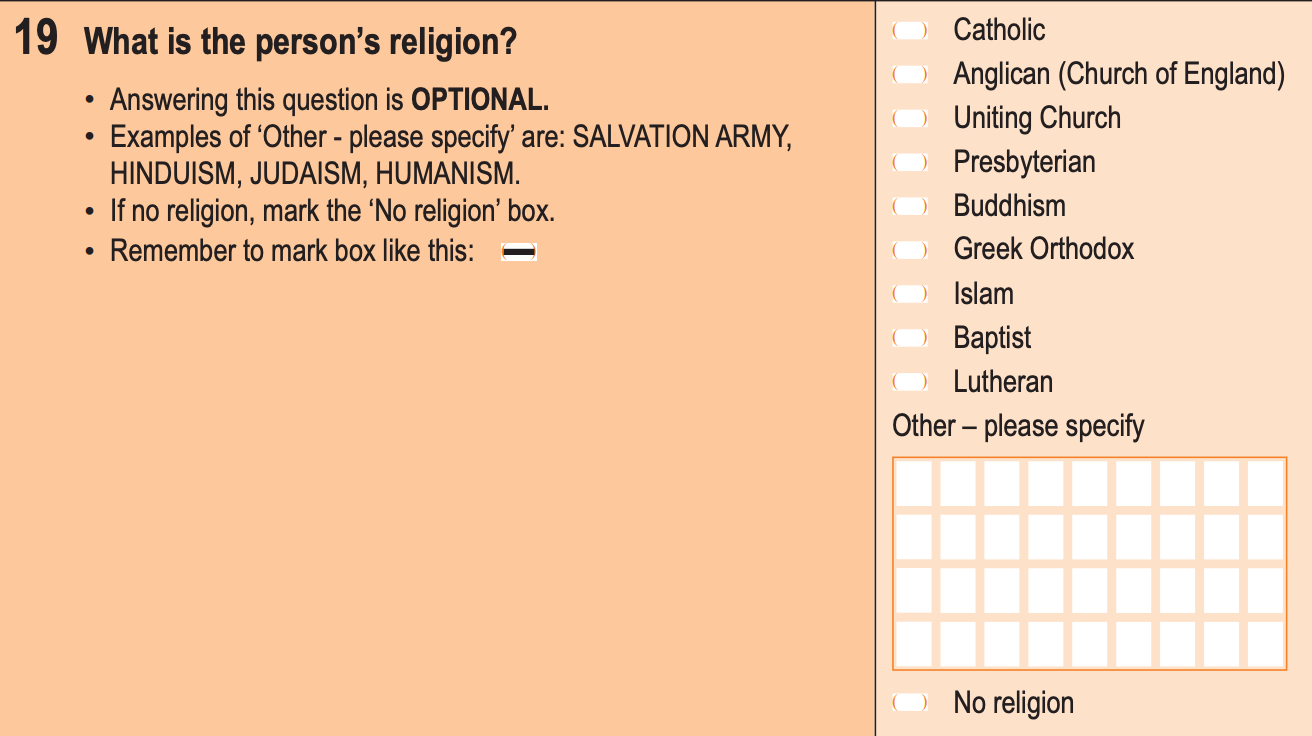
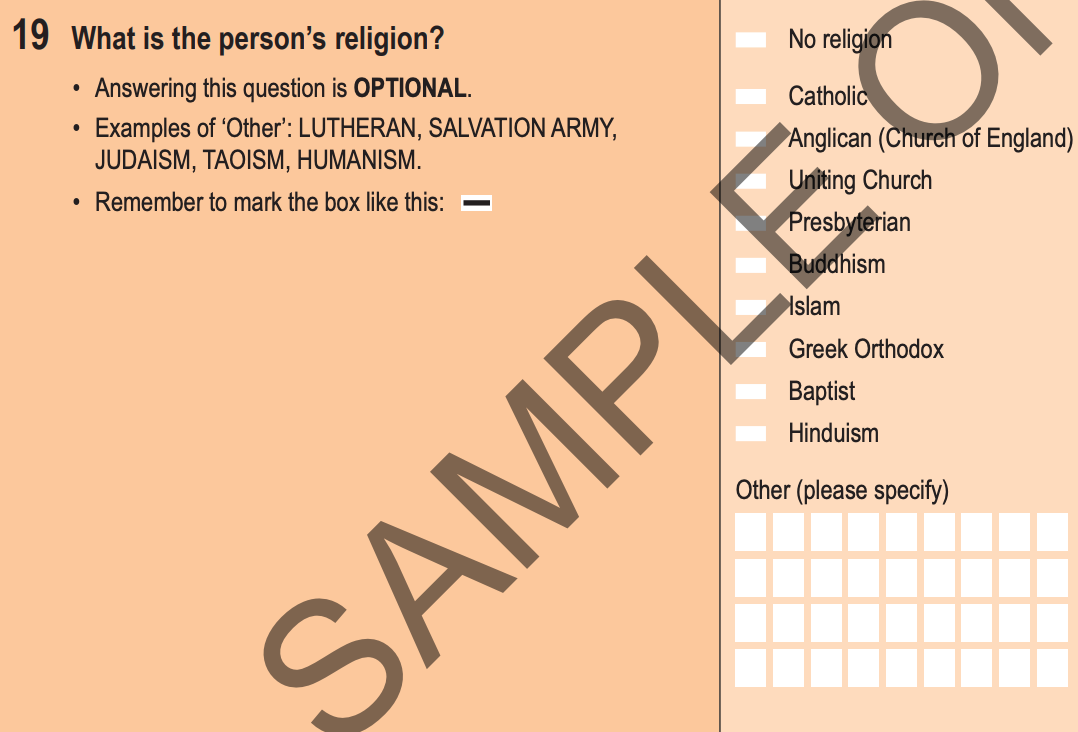
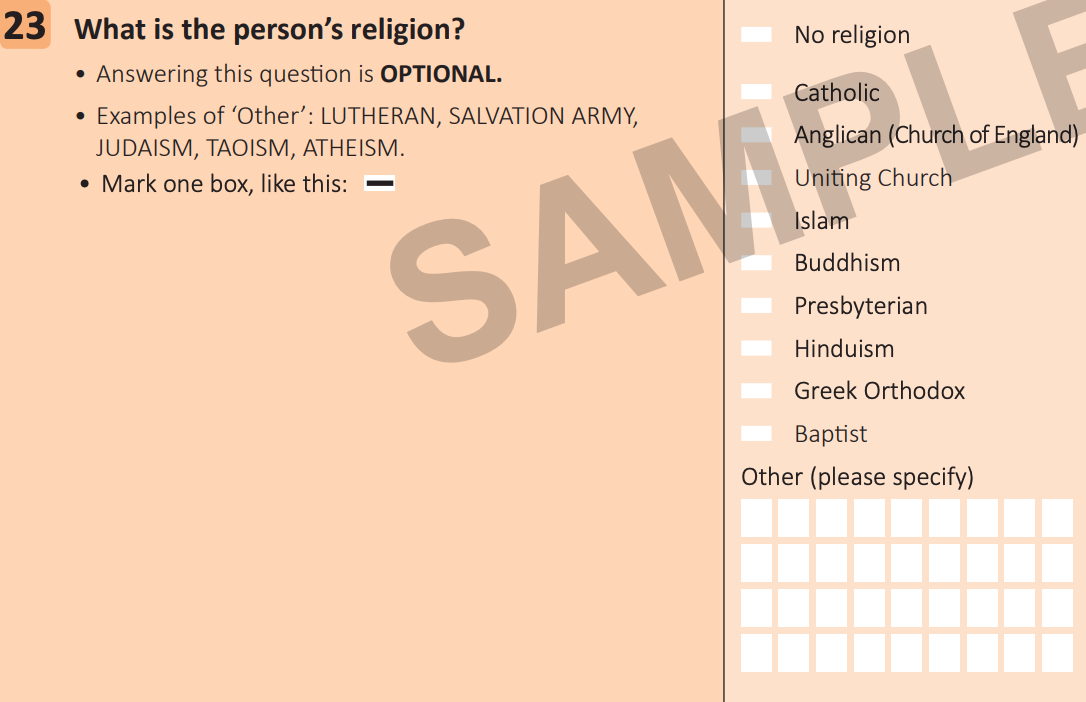

If the catholic church had its say, the options would have been:
- catholic
- pagan
- heretic
- apostate
It is also more difficult to read all the write in answers than it is to read the listed answers. However they do the data transfer from the paper questionnaire to the computer, a scanner or by hand, this type of question would be more difficult to do. Not defending their decision, because someone who is truly curious would find a way. Just saying I think some laziness on the Bureau’s part is a factor as well. But I’m also not surprised that the Catholics are involved in the decision making process. They shouldn’t have any more influence than anyone else. But they’re losing their privilege and it makes them sad.